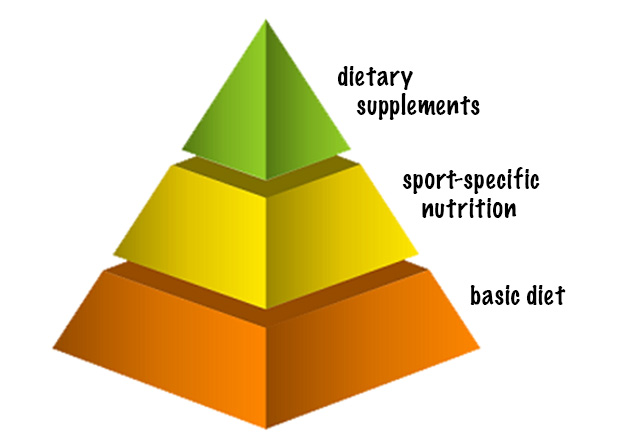You may have heard of the healthy eating food pyramid, well there is a sports nutrition version, comprised of three layers. At the bottom layer is your basic food and dietary intake which should be appropriate for the sport. The second tier is sport-specific foods, some of which can be classified as supplements, but generally, sports foods are things like sports drinks, gels, sports bars, things like that. And then at the top of the pyramid at the peak is the dietary supplements which include things like creatine, caffeine and a whole range of other ergogenic aids.
 the sports nutrition pyramid for athletes
the sports nutrition pyramid for athletes Bottom Layer: Basic Foods
At the base of the sports nutrition pyramid is your basic food and dietary intake which should be appropriate for the sport. As an upcoming athlete, the best advice is really to get the bottom of that pyramid right, to get the food, the timing, and the types of foods right. And just like in an actual pyramid, this will provide the foundation for exercise, providing the best fuel and best preparation of your body for training and competition.
Middle Layer: Sport-Specific Foods
The second tier of the sports nutrition pyramid is the sport-specific foods, generally sports foods are things like sports drinks, gels, sports bars, things like that. Sport-specific foods can also be very appropriate if you've been competing for a while, you may be starting to train twice a day, and you are aware you need to increase your energy requirements. Sports specific foods can be very useful in helping to get those extra nutrients and fuel needs that your body requires.
Peak: Dietary Supplements
At the top of the pyramid, at the peak, is the dietary supplements which include things like creatine and caffeine and a whole range of other ergogenic aids. This section is not for the beginner or recreational athlete.
Dietary Supplements and ergogenic aids can be useful, but only really at the pointy end of sport, for elite athletes, when you are getting the rest of your nutrition right. If you are going to your national championships, or if you are at the Olympic level, that's when I would be advising taking ergogenic aids. They're the 'one percenters' that will get you a tiny bit of improvement. But if you're not doing the rest of that pyramid right, that one per cent is not going to make much of a difference and is not worth it.
There are certain supplements that work and certain supplements that don't work, so getting the right advice from a sports dietitian or other sport science professional is paramount.
You also need to be careful about ingesting banned substances. For more information, go to the ASADA website (www.asada.gov.au). You can type in anything that you're taking and it will give you a description of the supplement, and whether it is allowed to be consumed by athletes. It's a really good resource for people if they're unsure about what they're taking.
Some of the tricky ones can be the protein powders which are not always just protein powder, they often have a whole layering of other supplements within them. These products are often marketed with fancy terms, like monster mass, muscle mass boosters. Just remember, if it seems too good to be true, it probably is.
This article is adapted from the transcript of an interview with Clare Wood, the Topend Sports' dietitian, conducted in 2018 by the WA Government's Department of Sports and Recreation as part of their 'Ask an Expert' series. The interview covers areas of what and when you should eat before a game, plus a discussion of energy drinks and supplements for athletes.
Related Pages
- Healthy eating food pyramid
- Sports Nutrition Tips
- Other sports nutrition resources for athletes


 Upcoming Events
Upcoming Events